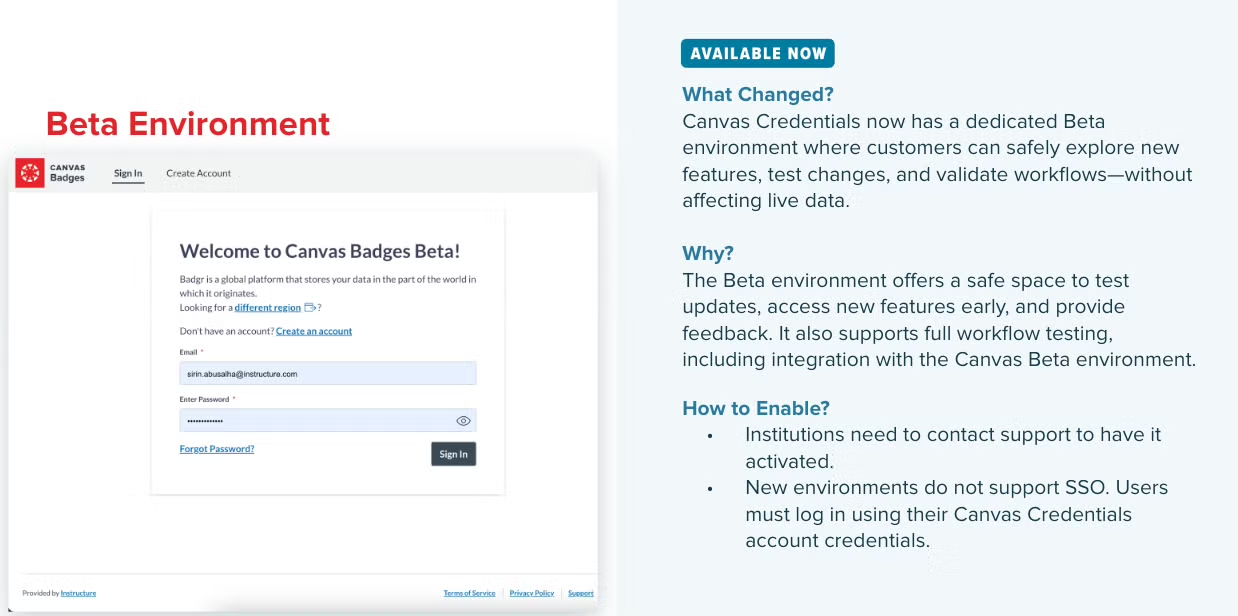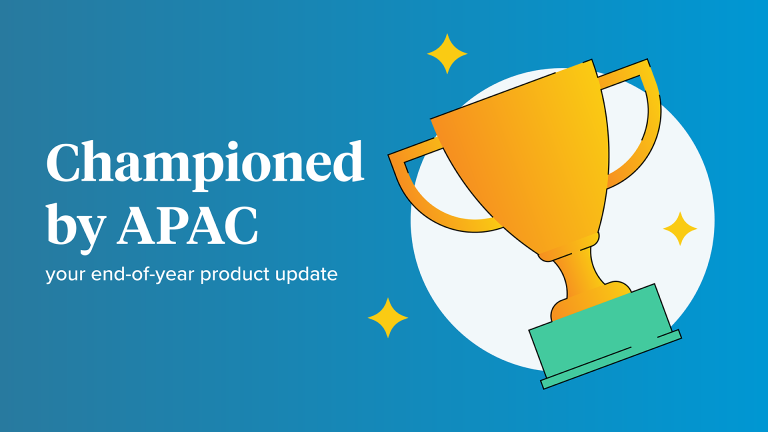From grading and assessment to AI and accessibility, here’s a look at the latest product updates across Canvas, Studio, Impact, and more.
Many of this quarter’s updates are the result of direct collaboration with educators and admins across the region, through user groups, discovery sessions, and early adopter programs. Whether you’ve shared feedback through your Customer Success Manager or participated in product testing, your insights are helping shape the evolution of our learning platform.
Here’s a look at what’s new, what’s coming soon, and how we’re supporting meaningful innovation across the learning journey. Prefer watching? View the recording here.
Innovating for the teaching and learning experience
Several Canvas enhancements this quarter are designed to support more collaborative, creative and efficient teaching and learning.
Canvas + Lucid integration
Canvas now integrates with Lucid, a whiteboarding solution that brings real-time collaboration into the LMS. Students receive personalised landing pages for brainstorming, study and teamwork, while educators can access a curated hub of resources contributed by fellow instructors. The integration supports assignment copy and blueprinting, and an announcement toolkit is available to help admins communicate the update to staff.
Intelligent Insights updates
The “Ask Your Data” feature in Intelligent Insights has been enhanced with shareable pinboards. Admins can now organise charts, tables and key metrics into self-serve dashboards and share them with other licensed users. Subaccount admins also have new tools to search and surface subaccount data more efficiently.
New quizzes improvements
Canvas continues to refine the new quizzes experience, with recent updates including:
- A new “multiple hotspot” question type for identifying more than one correct area in a diagram
- Improved navigation for quiz creation and completion
- More scalable accommodation APIs
- A new text block item type for inserting non-question content such as instructions
Further enhancements are in development, including expanded STEM question types and survey functionality.
Powering assessment across the learner journey
Canvas is introducing new features to support formative and summative assessment, with a particular focus on improving workflows for large cohorts.
SpeedGrader performance boost
SpeedGrader is now faster and more scalable, with significant improvements targeting load times and grading efficiency. The familiar interface and features—including audio and video feedback—remain unchanged. The upgraded version is currently available in feature preview and will be released to production by the end of June. Institutions are encouraged to explore it during semester breaks and share feedback to support continued improvements.
Canvas ePortfolios (coming soon)
A new ePortfolio tool is in early adopter testing and scheduled for feature preview in July. This solution will be fully integrated into Canvas and support two key use cases:
- Institution-led portfolios, structured by educators and aligned to assessment workflows
- Student-led showcase portfolios, which learners can customise and export after graduation
Institutions interested in early access can sign up here.
Supporting accessibility, credentialing, and connected learning
Recent updates across Canvas Credentials, Studio, Impact, and Catalog are helping institutions strengthen support for diverse learners while improving administrative flexibility and ecosystem visibility.
Canvas Credentials beta environment
Institutions using Canvas Credentials can now access a dedicated beta environment. This space allows users to safely explore new features, validate workflows, and test configurations without affecting their live data. The beta environment syncs weekly from production.

Accessibility support in Canvas Community and services
A new accessibility user group has been launched within the Canvas Community. It includes webinars, courses, best practice suggestions and customer insights. Engagement in the group has been high, highlighting strong interest in this space across the region.
In addition, Instructure’s services team is offering new partnership opportunities to support institutions in meeting accessibility requirements and progressing toward internal policy goals.
Studio: archive and restore media
Canvas Studio will soon introduce the ability to archive and restore media. This highly requested feature helps content creators manage their libraries more efficiently and supports compliance with storage policies.
Impact: accessibility and new templates
Impact is nearing WCAG 2.1 level AA compliance, with improvements to contrast, structure and keyboard navigation. The team is also preparing to launch accessibility-aligned walkthroughs and messages. These templates are designed to help administrators support educators in creating accessible Canvas courses at scale.
New integration: Impact and Catalog
For institutions using both Impact and Catalog, a new integration will provide real-time visibility into how students engage with Catalog. Admins will also be able to send in-app messages without needing custom JavaScript. This update is intended to help institutions guide learners more effectively, boost enrolment, improve retention and support course completion.
An early adopter program is available for those who wish to explore this functionality and provide feedback. Those interested can apply here.
Exploring AI and what’s next
AI continues to be a major focus for Instructure, and recent updates reflect a deliberate, education-first approach to innovation. This quarter’s session also included a preview of what to expect at upcoming CanvasCon events in the region.
Instructure’s AI strategy
Instructure is approaching AI with three priorities:
- Creating a consistent, guided AI experience across all product
- Providing transparency and choice around the AI tools being used
- Focusing on use cases that solve real problems for educators and learners
Features like the AI nutrition facts—already visible wherever AI is used in Canvas—are designed to support informed adoption. The company is also working to address concerns about low AI literacy and fragmented user experiences by building a unified, LMS-native AI ecosystem.
New and upcoming AI tools
Several AI-powered features are already available or in development. These include:
- A discussion summary tool currently available for testing
- A new rubric authoring feature aimed at helping educators focus on high-value work
- Upcoming multimodal AI agents designed to reduce repetitive admin tasks and personalise the learning experience for students
The emphasis is on improving teacher efficiency and reducing time spent on routine tasks, rather than introducing novelty for its own sake.
CanvasCon: a deeper look at what’s next
Instructure will share more details about its AI roadmap and broader product strategy at upcoming CanvasCon events in the region.
- CanvasCon ANZ will be held in Adelaide on 18–19 August
- CanvasCon Philippines will take place in Manila on 10 September
Educators and leaders are encouraged to attend, submit presentation proposals, and connect with peers from across the region. Submissions are open through the end of this week, and support is available for anyone preparing a proposal.
We’re grateful to everyone who joined the June session and shared their insights. As always, your feedback helps shape what comes next, so please stay connected, get involved in early adopter programs, and reach out to your CSM with any questions.




